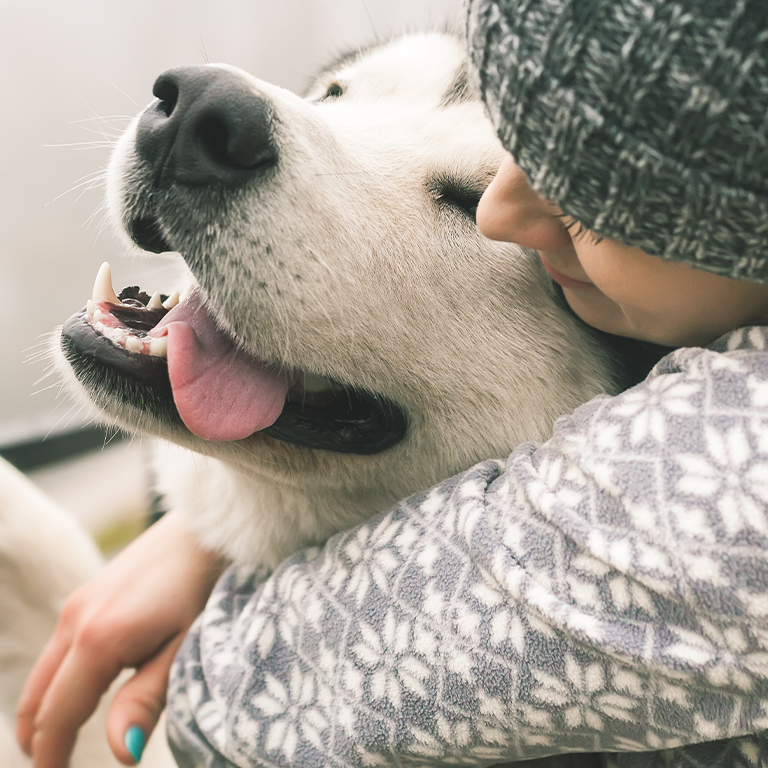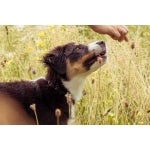

Snow is a great thing and your furry friend loves the cool white. But unfortunately, the cold season also brings dangers. Road salt and antifreeze, sand and grit can spoil your four-legged friend's winter fun. But don't worry! If you follow our tips for your furry friend, being outside in winter can be great fun and keep you and your dog fit and healthy.
Not only children are fascinated and want to be outside, your fluffy furry friend also wants to play and romp in the snow. Take advantage of the beautiful winter weather and enjoy time with your four-legged friend. A snowball fight or simply dashing through the fresh snow is also great fun for your dog. However, there are a few things you should bear in mind when romping around in the snow.
Is my dog allowed to eat snow?
It is not a bad thing if your furry friend eats a little snow, but the amount should remain small, otherwise this could lead to diarrhea and lower the body temperature.
In the worst case scenario, your furry friend could even develop "snow gastritis". This is an inflammatory disease of the stomach lining. Abdominal pain, vomiting, diarrhea and fever are the unpleasant consequences. If it does happen that your curious nose has eaten too much snow and is showing symptoms, you should visit your vet, depending on the general condition of your furry friend.
Can my dog get cold?
Yes, even dogs can get cold. While we dog moms and dads only go outside well wrapped up in winter, our four-legged friend can rely on his winter coat.
Outside, you should always keep moving on the cool ground so that your furry friend doesn't get cold. Be careful not to leave your four-legged friend waiting anywhere for too long in very cold weather - be it in an unheated car or outside the supermarket on icy floors, for example. Especially breeds without an undercoat and with short fur can quickly freeze and become hypothermic on particularly cold days if they don't move.
What signs indicate my dog is cold?
- Shiver
- Tuck tail
- Pull up the back
- Clammy and slow walking
If you notice one or more of these signs, it's time to take your furry friend out into the warmth.
How do I care for my dog's coat in winter?
Your four-legged friend's coat often remains damp for a long time after winter walks, especially if it has rained or snowed. That's why you should always dry him thoroughly at home and wrap him in a blanket if necessary.
If the winter is particularly mild, your dog may shed a lot of fur as early as December. Although shedding happens automatically, it is stressful for many dogs and they suffer from increased itching. The shedding hair often gets caught in the coat, causing it to quickly become knotted and matted. So take enough time for your four-legged friend and brush him more often than usual.
Are paw protection and care necessary in winter?
Unfortunately, the first snowfall is also accompanied by the spreading of salt, sand or grit. Paw protection and paw care are a must. The aggressive salt often leads to cracks in the paw pads. Sand and grit also cause unpleasant pain when walking.
Check your four-legged friend's paws and remove any lumps of snow or leftover grit. Wash the paws with lukewarm water after every walk. On the one hand, your dog won't lick off the dirt and salt and, on the other hand, you won't have the dirt and remains of salt, sand and grit in your home.
If the paws are dry and cracked, there are special paw ointments that you can apply after washing.
Our Tip
Long hair on the paws encourages the formation of snowballs in winter.
Carefully trim the long fur between the toes with scissors.
How can I keep my dog busy in the snow?
Many dogs are so taken with the snow and are sufficiently occupied with themselves, playing and romping around. Others need your support - search games in the snow are a welcome distraction. Simply hide a few treats and your furry friend will become a curious nose and enjoy digging and burrowing in the snow.
And if the winter weather is absolutely not inviting you both outside, then simply send your furry friend home in search of treats.
Or practise a few tricks with your four-legged friend in your home.
Du hast weitere Fragen rund um die kalte Jahreszeit?
Wende Dich gerne vertrauensvoll an unsere Ernährungsexperten, sie stehen Dir gerne per Mail und telefonisch über unsere kostenlose Hotline zur Verfügung.
Telefon: +49 (0) 800 333 8 222 (gebührenfrei)
E-Mail: expertenteam@bosch-tiernahrung.de
Montag - Freitag: 7.30 - 12 Uhr und 13 - 16 Uhr




























